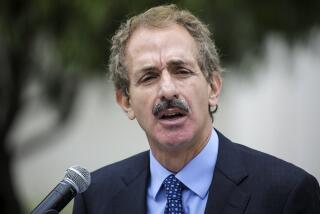Questioning Grows Heated in Extortion Trial : Threats: A prosecutor admits he “fired no fatal arrows” during the trial of two men who are charged with mailing hundreds of “pay or die” letters.
- Share via
A prosecutor spent three hours Wednesday grilling one of two men accused of mailing hundreds of extortion letters to prominent Antelope Valley residents last year, alleging that the defendants made an abrupt trip to the East Coast in order to construct an alibi.
At one point during several combative exchanges in San Fernando Superior Court, defendant Richard Faroni appeared to contradict testimony by his father that the defendants gave little advance notice of their trip to Faroni’s Connecticut hometown during the period in late 1988 when the letters were mailed.
But Deputy Dist. Atty. Stephen L. Cooley acknowledged Wednesday that he “fired no fatal arrows” during the cross-examination of Faroni, a former Lancaster aerospace technician who faces charges of attempted extortion and conspiracy along with former co-worker Roman Makuch.
Defense attorney William A. Clark said the prosecution assault backfired when Cooley produced phone company records to counter Faroni’s claim that he called his parents frequently. Faroni responded that he had used a long distance company; Cooley later conceded that investigators had not obtained records for that company.
Clark said: “I call that putting yourself out on a limb and getting it hacked off by someone with a chain saw.”
Cooley’s duel with Faroni, who served as an Army communications expert because of his exceptional intelligence and memory, produced the most exciting day of the month-old trial. Cooley hammered away at the account of a trip from Las Vegas to Connecticut, where the defendants spent about 10 days, putting them out of town on Oct. 31, 1988. Prosecutors believe an accomplice mailed the letters that day after Makuch and Faroni had prepared them.
Cooley suggested it was more than coincidence that Faroni called an acquaintance in Los Angeles from Connecticut on Oct. 31, noting the acquaintance told investigators that Faroni left a message that the call was urgent but then “just talked about the weather.”
“Isn’t it a fact that you were trying to establish a telephonic record of your whereabouts, an independent record with an independent witness?” Cooley demanded.
“I don’t see why I would do that,” Faroni responded.
Cooley cited preliminary hearing testimony by Faroni’s father, Richard Faroni Sr., to attack Faroni’s assertion that his father asked him to come home in a phone call a week before the trip. The elder Faroni did not mention asking his son to visit, testifying that the younger Faroni gave no prior warning other than a phone call Oct. 25 announcing he would be arriving in two days for his first visit since May, 1985.
The discrepancy shows the trip was intended to provide an out-of-town alibi, Cooley said.
Judge Ronald S. Coen questioned Faroni about his possession of two CB radios of the type victims were instructed to purchase in the extortion letters, which demanded millions of dollars. No money was ever collected.
Faroni testified Tuesday that he bought the radios as gifts for family members in Connecticut but forgot to bring them. On Wednesday, he told Coen he was unable to pick up the radios from storage because he and Makuch stopped to help victims of a car accident on the day of their flight.
Cooley called the testimony inconsistent, saying, “They are trying to disassociate themselves from the radios because the radios would have been essential to the extortion plot.”
More to Read
Sign up for Essential California
The most important California stories and recommendations in your inbox every morning.
You may occasionally receive promotional content from the Los Angeles Times.









